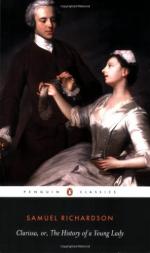Well, my dearest life, what say you to your uncle’s expedient? Shall I write to the Captain, and acquaint him, that we have no objection to it?
She was silent for a few minutes. At last, with a sigh, See, Mr. Lovelace, said she, what you have brought me to, by treading after you in such crooked paths!—See what disgrace I have incurred!—Indeed you have not acted like a wise man.
My beloved creature, do you not remember, how earnestly I besought the honour of your hand before we came to town?—Had I been then favoured—
Well, well, Sir; there has been much amiss somewhere; that’s all I will say at present. And since what’s past cannot be recalled, my uncle must be obeyed, I think.
Charmingly dutiful!—I had nothing then to do, that I might not be behind-hand with the worthy Captain and her uncle, but to press for the day. This I fervently did. But (as I might have expected) she repeated her former answer; to wit, That when the settlements were completed; when the license was actually obtained; it would be time enough to name the day: and, O Mr. Lovelace, said she, turning from me with a grace inimitably tender, her handkerchief at her eyes, what a happiness, if my dear uncle could be prevailed upon to be personally a father, on this occasion, to the poor fatherless girl!
What’s the matter with me!—Whence this dew-drop!—A tear!—As I hope to be saved, it is a tear, Jack!—Very ready methinks!—Only on reciting!—But her lovely image was before me, in the very attitude she spoke the words—and indeed at the time she spoke them, these lines of Shakespeare came into my head:
Thy heart is big.
Get thee apart and weep!
Passion, I see,
is catching:—For my eye,
Seeing those beads
of sorrow stand in thine,
Begin to water—
I withdrew, and wrote to the Captain to the following effect—’I desired that he would be so good as to acquaint his dear friend that we entirely acquiesced with what he had proposed; and had already properly cautioned the gentlewomen of the house, and their servants, as well as our own: and to tell him, That if he would in person give me the blessing of his dear niece’s hand, it would crown the wishes of both. In this case, I consented, that his own day, as I presumed it would be a short one, should be ours: that by this means the secret would be with fewer persons: that I myself, as well as he, thought the ceremony could not be too privately performed; and this not only for the sake of the wise end he had proposed to answer by it, but because I would not have Lord M. think himself slighted; since that nobleman, as I had told him [the Captain] had once intended to be our nuptial-father; and actually made the offer; but that we had declined to accept of it, and that for no other reason than to avoid a public wedding; which his beloved niece would not come into, while she was in disgrace with her friends. But that if he chose not to do us this honour, I wished that Captain Tomlinson might be the trusty person whom he would have be present on the happy occasion.’




